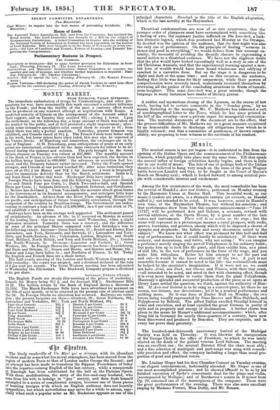3111toir.
The musical season is not yet begun—it is understood to date from the opening of the Italian Opera and the commencement of the Philharmonic Concerto, which generally take place near the same time. Till that epoch the annual influx of foreign celebrities hardly begins, and there is little stir in our world of music. The fate of one or perhaps both of the Italian theatres is believed to hang very much on the issue of the great Wagner battle between Lumley and Gye, to be fought in the Court of Queen's Bench on Monday next ; which is looked forward to among musical peo- ple with considerable interest and excitement.
Among the few occurrences of the week, the most remarkable has been the revival of Handers Aces and Galatea, performed on Monday evening by the Harmonic Union at Exeter Hall. This beautiful work, as our musical readers are aware, is a dramatic cantata (or serenata, as Handel called it,) not intended to be acted. It was, however, acted in Handers own time, at the Haymarket ,Theatre, but without his sanction ; and that performance drew from him this counter-announcement—" June 10 [1732] will be performed Acis and Galatea, a serenata, revised with several additions, at the Opera House, by a great number of the best voices and instruments. There will be no action on the stage ; but the scene will represent in a picturesque manner a rural prospect, with rocks, groves, fountains, and grottoes among which will be disposed a chorus of nymphs and shepherds ; the habits and every decoration suited to the subject." We know not what effect was produced by this half-and-half way of performance, but it could hardly be satisfactory. If there were scenery, and decorations, and habits, why not acting ? We can imagine a performer merely singing the part of Polyphemus in his ordinary habit; but make him up to look like the giant, and then exhibit him, as a piece of still life, in the row of performers on the front of the stage, and you make him ridiculous. Better let him attempt to act the part out and out—it would be the lesser absurdity of the two. A part is not unactable because it cannot be acted to the life—the verisimilitude must be helped by the spectator's imagination. If it were not so, we could not have Ariel, nor Puck, nor Oberon and Titania, with their tiny court, —all intended to be acted, and acted in fact with charming effect, though it is even more impossible to realize them than the giant Polyphemus. Macready's splendid and successful production of the piece as an opera at Drury Lane settled the question, we think, against the authority of Han- deL If Acts and Galatea is to be sung as a concert-piece, let there be no scenes, nor dresses, nor decorations' let it be a musical performance and nothing more. So it was done at Exeter Hall on Monday ; the two lovers being vocally represented by Sims Reeves and Miss Stabbach, and Polyphemus by Belletti. The gifted Italian excelled Staudigl himself in voice and execution, and at least equalled the great German in purity of style and in propriety and energy of declamation. A further charm was given to the music by Mozart's additional accompaniments; which, after lying hid in Germany for nearly three-quarters of a century, have now been discovered and produced by Benedict. They are exquisite, and in every bar prove their paternity.
































 Previous page
Previous page